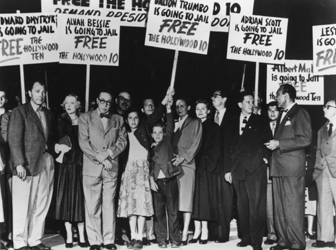
The Hollywood blacklist refers to the mid-20th century banning of suspected Communists from working in the United States entertainment industry. The blacklist began at the onset of the Cold War and Red Scare, and affected entertainment production in Hollywood, New York, and elsewhere. Actors, screenwriters, directors, musicians, and other professionals were barred from employment based on their present or past membership in, alleged membership in, or perceived sympathy with the Communist Party USA (CPUSA), or on the basis of their refusal to assist Congressional or FBI investigations into the Party's activities.
Even during the period of its strictest enforcement from the late 1940s to late 1950s, the blacklist was rarely made explicit nor was it easily verifiable. Instead, it was the result of numerous individual decisions implemented by studio executives and was not the result of formal legal statute. Nevertheless, the blacklist directly damaged or ended the careers and incomes of scores of persons working in film, television, and radio.
Although the blacklist had no official end date, it was generally recognized to have weakened by 1960, the year when Dalton Trumbo – a CPUSA member from 1943 to 1948[1] and one of the "Hollywood Ten" – was openly hired by director Otto Preminger to write the screenplay for Exodus (1960).[1] Several months later, actor Kirk Douglas publicly acknowledged that Trumbo wrote the screenplay for Spartacus (1960).[2] Despite Trumbo's breakthrough in 1960, other blacklisted film artists continued to have difficulty obtaining work for years afterward.
- ^ a b Nordheimer, Jon (September 11, 1976). "Dalton Trumbo, Film Writer, Dies. Oscar Winner Had Been Blacklisted". The New York Times.
- ^ Kirk Douglas, "My Spartacus Broke All the Rules" Archived 2015-11-10 at the Wayback Machine, The Daily Telegraph